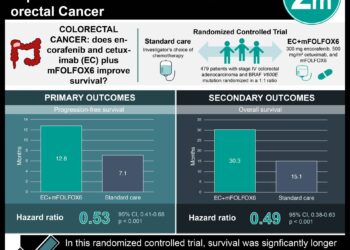Addition of bevacizumab to standard therapy improves outcomes in metastatic colorectal cancer
1. Adding bevacizumab to mFOLFOX6 therapy among patients with RAS mutant metastatic colorectal cancer led to an increased rate of liver metastases resection, which has previously been demonstrated to improve survival.
2. Bevacizumab addition to standard therapy was associated with increased overall survival and progression-free survival at three years.
Evidence Rating Level: 2 (Good)
Study Rundown: It is known that among patients with metastatic colorectal cancer, resection of liver metastases confers a mortality benefit; however, less than 20% of patients have liver lesions that are initially amenable to resection. A first line treatment for metastatic colorectal cancer known to shrink lesions and facilitate the transition to surgical intervention has historically been mFOLFOX6, a regimen based on fluorouracil, leucovorin, and oxaliplatin. Based on newer evidence, it has become to standard practice to add bevacizumab, a monoclonal antibody directed against vascular endothelial growth factor (VEGF), to mFOLFOX6, as it has been shown to improve survival among patients with metastatic colorectal cancer. Less is known, however, about its benefit specifically among patients with RAS mutant disease, a very common oncogene activated in colorectal cancer patients. This single-center, randomized controlled trial evaluated whether adding bevacizumab to mFOLFOX6 therapy in patients with RAS mutant colorectal cancer would result in more resections of liver metastases. It was found that patients in the bevacizumab plus mFOLFOX6 cohort had a significantly higher rate of resection of liver metastases. Additionally, at three years, overall survival was higher and progression-free survival was longer among the bevacizumab plus mFOLFOX6 cohort. These findings suggest that adding bevacizumab to mFOLFOX6 increased the resection rate of liver metastases among patients with RAS mutant colorectal cancer. Important limitations of this study, however, include the failure to use a placebo control in the mFOLFOX6 alone cohort, and the use of resection rate as the primary outcome as opposed to a validated marker such as overall survival.
Click here to read the study in the Journal of Clinical Oncology
Relevant reading: Randomized phase III study of bevacizumab plus FOLFIRI and bevacizumab plus mFOLFOX6 as first-line treatment for patients with metastatic colorectal cancer
In-depth [randomized controlled trial]: 121 patients (median [range] age = 58 [29-75] years, 65.3% male) were randomized to receive bevacizumab plus mFOLFOX6 while 120 patients (median [range] age = 59 [24-72] years, 66.7% male) were randomized to receive mFOLFOX6 alone. Following post-treatment assessment of resectability, 27 patients in the bevacizumab plus mFOLFOX6 cohort and 7 patients in the mFOLFOX6 alone cohort underwent radical surgery for resection of liver metastases (22.3% vs. 5.8%, p < 0.001). There were no serious peri- or post-operative complications in either cohort; in particular, there was no increased risk of bleeding or thrombosis among patients receiving bevacizumab, which are distinct risk factors associated with VEGF-targeting drugs. When comparing the bevacizumab plus mFOLFOX6 cohort with the mFOLFOX6 alone cohort at three years, overall survival was found to be higher (25.5% vs. 20.5%, HR 0.71, p = 0.31), and progression-free survival was longer (9.5 vs. 5.6 months, HR 0.49, p < 0.001). A secondary, subgroup analysis revealed that the benefits of the higher rate of resection among the bevacizumab plus mFOLFOX6 cohort were consistent across colorectal cancer sidedness (interaction p = 0.66) and primary tumor status (interaction p = 0.225).
Image: PD
©2020 2 Minute Medicine, Inc. All rights reserved. No works may be reproduced without expressed written consent from 2 Minute Medicine, Inc. Inquire about licensing here. No article should be construed as medical advice and is not intended as such by the authors or by 2 Minute Medicine, Inc.



![2 Minute Medicine: Pharma Roundup: Price Hikes, Breakthrough Approvals, Legal Showdowns, Biotech Expansion, and Europe’s Pricing Debate [May 12nd, 2025]](https://www.2minutemedicine.com/wp-content/uploads/2025/05/ChatGPT-Image-May-12-2025-at-10_22_23-AM-350x250.png)



